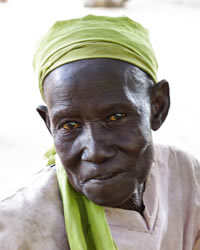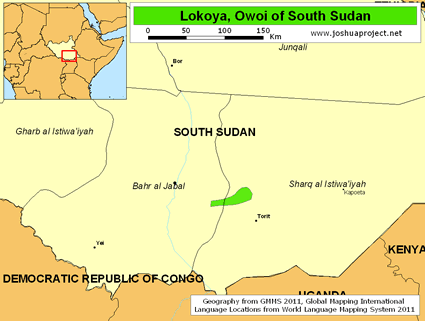The Lokoya, also known by names such as Owoi, Lokoja, Lowoi, and Oxoriok, are a Nilotic ethnic group residing primarily in Eastern and Central Equatoria states of South Sudan. Their language, Lokoya, is part of the Eastern Nilotic branch of the Nilo-Saharan language family and is closely related to Lotuko.Historically, the Lokoya are believed to have migrated from East Africa alongside other Ohoryok groups such as the Lotuka. The name "Lokoya" is a distortion of "Akokoya," a nickname given by the Bari people due to cattle rustling practices. Their society is stratified into occupational groups, including priests, blacksmiths, and farmers, each playing a role in cultural and spiritual life.
The Lokoya inhabit hilly terrain dissected by valleys and seasonal streams, covered with dense vegetation. They are agro-pastoralists, raising cattle, goats, and sheep while cultivating crops such as sorghum, maize, simsim (sesame), groundnuts, and millet. Agricultural and hunting activities are regulated by spiritual leaders, with rituals marking the beginning of each season.Their society is stratified into occupational groups, including peasants (Ohoromok), chief priests (Ohobusi), blacksmiths (Ohoidwongok), and medicine practitioners (Ohoinwanak). Social events such as harvest festivals (Ohilango) and seasonal dances are central to community life. Marriage customs emphasize courtship, bride-wealth, and lineage purity, with strict prohibitions against marrying close kin.
The Lokoya predominantly practice ethnic religions, with approximately 10–50% identifying as Christian and 5–10% as evangelical believers. Their traditional belief system includes reverence for ancestral spirits, nature deities, and sacred mountains. Ritual authority is held by chief priests who oversee agricultural and hunting rites.Christianity has made limited inroads, often blending with indigenous practices. Churches exist in some areas, but biblical literacy and discipleship are minimal. The lack of Scripture in the Lokoya language hinders spiritual growth and understanding of the gospel.
The Lokoya people face several critical needs, including the absence of a complete Bible translation in their language, which limits access to Scripture and spiritual growth; a shortage of trained Christian leaders and foundational teaching among believers, hindering discipleship and evangelism; the unavailability of Christian media such as the Jesus Film, gospel recordings, and radio broadcasts in Lokoya; a lack of essential education and healthcare resources like schools, clinics, and clean water, which contributes to poverty and preventable diseases; and the need for culturally sensitive evangelism to engage meaningfully with their strong traditional belief system.
Please pray for the translation and distribution of the Bible in the Lokoya language, and ask God to raise up local evangelists and pastors who can disciple believers and plant churches.Pray also for spiritual openness among those practicing traditional religions, that the gospel may be shared with respect and understanding.Intercede for the development of Christian media resources—such as audio recordings, films, and radio—in Lokoya and pray for healing and hope to reach communities affected by poverty, isolation, and a lack of basic services.
Scripture Prayers for the Lokoya, Owoi in South Sudan.
AI generated by Copilot101 Last Tribes: Lokoya PeopleWikipedia: Lokoya People
| Profile Source: Joshua Project |











